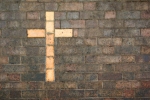September 2020
Stewardship and Abundance
Abundant Love in Scarce Times
Indigenous peoples have always been considered stewards of God's creation. We are stewards of mother earth, father sky and all living things. Indigenous peoples worked the land; our culture and our existence are rooted in prayer. Coexisting with the physical creation and the spiritual creation is our foundation. Navajoland, located near the four corners, where Arizona, Utah, Colorado and New Mexico meet, was given to us by Creator. We consider the land within our four sacred mountains our motherland. It is said that when an infant’s umbilical cord falls off shortly after birth, the parents bury it on the family land, so the child is tied to the area. When they become adults, they return to their homeland and never forget they are children of Diné Bikéyah (Navajoland).
In the cycle of life, we each experience birth, adolescence, adulthood, become elders and complete the life cycle in death. Throughout life, we go through ups and downs; we undergo learning and teaching moments and sometimes, the order of life becomes disturbed. We then need to contemplate our options to find what leads us astray. We meditate and pray. We are in a ceremony to try to restore balance in a world turned upside down.
COVID infections and deaths in Navajoland make the news
While many countries, cities, towns and villages continue to experience the global pandemic, COVID-19, Navajoland recently made national and international headlines. Not for our resilience, but for our high rates of infection and death due to the virus. We had the third-highest infection rate per capita in the country, behind New York and New Jersey.
Our reservation is about 27,000 square miles, roughly the size of Virginia. We are a sovereign nation with hospitals, clinics, a court system and police. Our land is beautiful, with never-ending blue skies and red rock formations full of our creation stories. But the area can also be unforgiving and rugged. Many homes do not have running water, electricity or Wi-Fi. Our hospitals do not have many specialty clinics. They have a handful of physicians and not enough Intensive Care Units. Our land only has 13 grocery stores, and the border towns, towns that sit at the border of the Navajo reservation, are not always friendly to our people.
Generosity and words of support, like a warm, firm hug
Many families were already experiencing food insecurity before the shelves at all local and non-local supermarkets ran dry. Many large news organizations featured our difficulties and our COVID-19 death rate. The effect of COVID-19 on Navajoland showed the real picture of how impoverished many communities are. Soon friends from across the nation and the world began sending Personal Protective Equipment (PPE), basic needs items and donations to Navajoland, assisting us in creating a food box ministry for our communities. The generosity and words of support from individuals hundreds of miles away, experiencing the same pandemic, is nothing short of a miracle. It is love.
We have pored over the many notes on post-its, index cards, notebook and printer paper, each sharing a glimpse of donors’ lives, family and home. The hands that wrote well wishes, prayers and hopes for good luck are, like ours, molded in clay by God and given the same breath of life. Sometimes we forget that we are made in God’s image and share that bond as fellow stewards of the earth.
This year we share similar life journeys – this plague that has halted nations and the world, this global pandemic. What we do as individuals will and does influence the way this pandemic is won. By sharing, receiving and giving, we have become united at this moment that seems like a lifetime. And I must tell you that this unity feels like a warm, firm hug after tirelessly walking in the wilderness looking for a glimpse of hope – hope that seemed like a mirage. These mundane personal touches have been a boost to our morale. They are a testament to the relational stewardship that we have received.
Throughout the rugged red bluffs, white sandy ravines and dense forested areas of the mountains, small pockets of communities exist. These communities are filled with multi-generational families, living miles from busy city streets, paved roads, water lines and electricity. A handful of these communities have been hit hard by COVID and made to lockdown completely, as COVID spreads like wildfire. These lockdowns happen in communities that do not have grocery stores. No one can travel in or out of these quarantined communities. The whole reservation also sees nightly curfews weeknights from 8 pm to 5 am along with Navajo Nation-wide weekend lockdowns from 8 pm Friday to 5 am Monday. Violators of the curfews and lockdowns face stiff fines and possible jail time. What little jobs that were available on the reservation have closed, leaving many unemployed. Schools that are the primary providers of healthy food for children, have also closed. While the nation worked tirelessly to feed the quarantined communities, the rest of the reservation went unnoticed. How were the families already struggling before the pandemic going to continue?
In response to our struggle, numerous dioceses publicized our need for cloth masks, and the Episcopal body went to work sewing for us. We were able to distribute these handmade cloth masks to hundreds of families across Navajoland and to organizations working directly with individuals who have tested positive for COVID. The PPE we received went to four hospitals and clinics treating our people.
Love and care of so many for the people of Navajoland is an expression of faith
Two hundred fifty. That is the number of families we currently feed every two weeks in nine communities, and that number continues to grow daily with the donations sent for COVID Relief. Many clergy and laypeople work day and night, assembling and delivering much-needed food, hygiene items and diapers across hundreds of miles. It is a blessing to be able to provide these necessities to our people and all in need in and around our Navajoland communities. Clergy and laypeople go out to assess the needs of our elders, who are the carriers of our tradition, culture, and language. How we react today will determine our future.
Along with the nourishment of the body, there is also a need to nourish our spirit and soul. We send daily prayers, meditations and reflections in emails, text messages and on social media. Morning prayer is live-streamed or prerecorded and edited. It isn't easy to stay in community when we cannot engage with our community in person. Lack of resources prevents us from communicating with all our people via zoom or social media. The in-person check-in is still needed, and ministry in Navajoland is vital.
How we protect each other is an expression of our faith. Thank you for your generosity, for your prayers, for your donations, and your hands.
Gerlene Gordy (GJ) is Navajo from Coal Mine, New Mexico. Her clans are; One who walks around born into the Salt People. Edge Water is her maternal grandparents, and Mud People are her paternal grandparents. Clanship is essential to Navajo people for greeting and establishing relations. She is the Communication Director for the Episcopal Church in Navajoland (ECN) and a web developer for Cheii’s Web, which was founded by ECN. She wants to help share our stories. She has a 5-year-old daughter and husband. She has worked with children for 12+ years and enjoys sweet tea on a hot New Mexico afternoon
Resources:
- When You Can’t Pass the Offering Plate... by Ken Howard, ECF Vital Practices blog, April 7, 2020
- Pleasant and Effective Stewardship by Linda Buskirk, ECF Vital Practices blog, October 7, 2019
- Navajo Millennial by GJ Gordy, ECF Vital Practices blog, June 20, 2019
- Ministry in a Global Pandemic an ECF webinar presented by Joshua Rodriguez-Hobbs June 11, 2020






